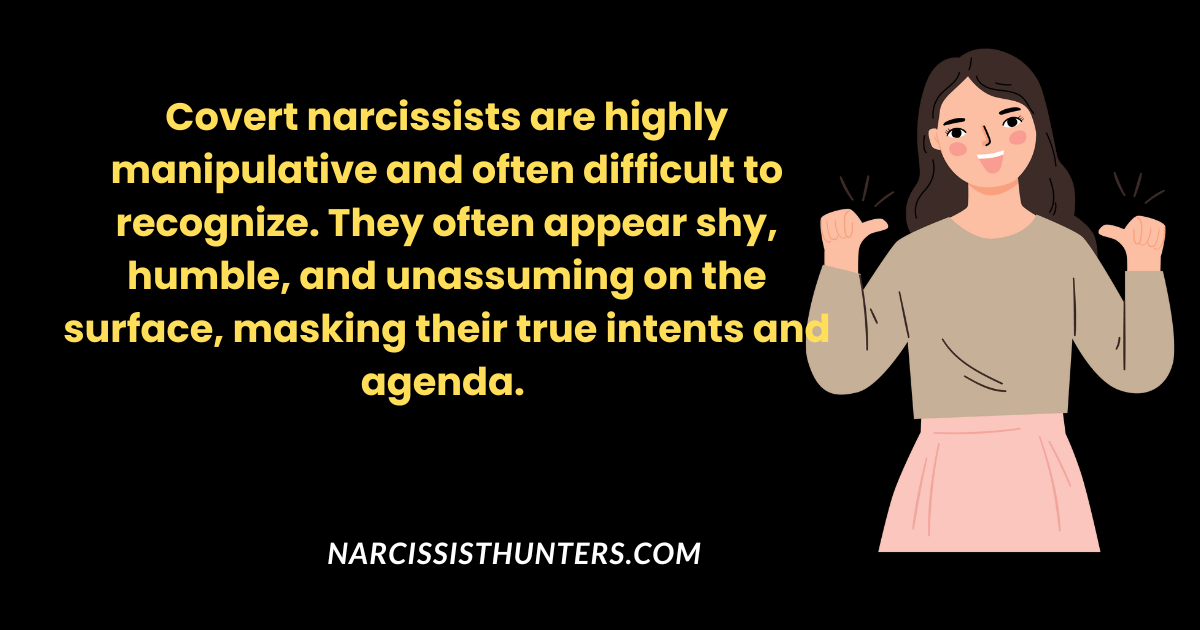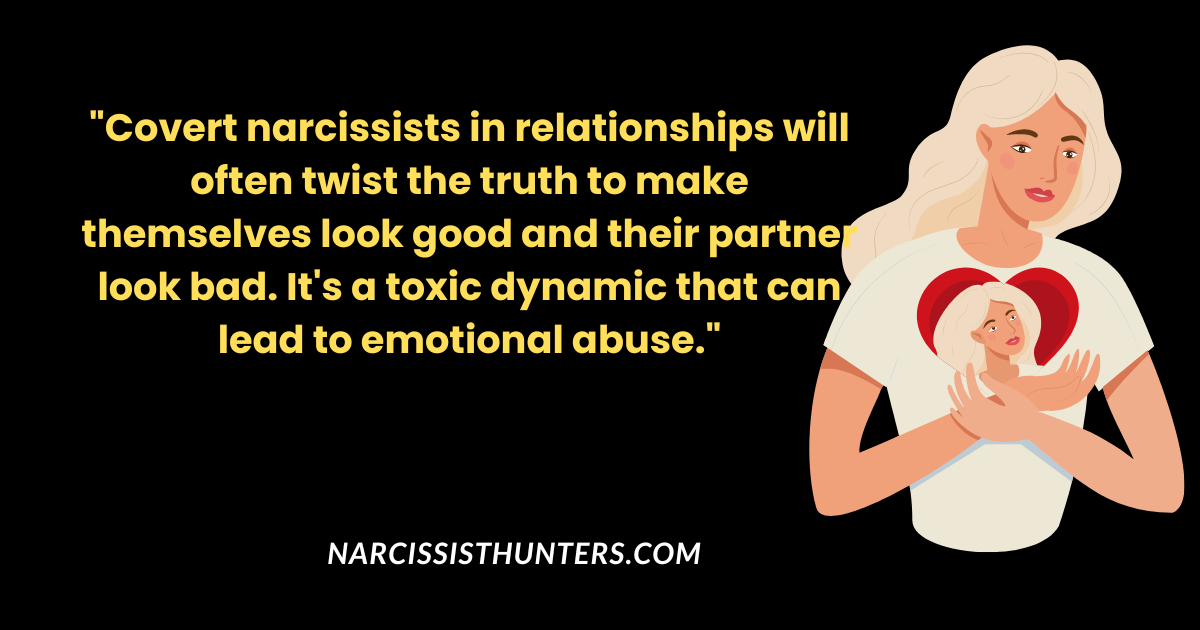Narcissism is a personality trait characterized by excessive self-love, self-admiration, and self-centeredness. Narcissism can take different forms, and people with this personality trait may manifest different behaviors. While some individuals with narcissistic personality disorder exhibit overt narcissism, others show signs of covert narcissists. Understanding covert narcissism is very important because it can be challenging to recognize this behavior, and individuals with this personality type can cause significant harm to those around them.
In this blog post, we will explore the concept of covert narcissism, its signs, and how it differs from overt narcissism. We will also provide examples of covert narcissists and delve into the causes of this covert narcissism. Finally, we will discuss effective ways to deal with or respond to a covert narcissist.
What is Covert Narcissism?
Covert narcissism is a form of narcissism that is less visible than overt narcissism. Individuals with covert narcissism have a strong sense of self-importance, but they express it in subtler ways. They may appear shy, modest, and unassuming, but their behavior is driven by their excessive need for attention and admiration.
Unlike overt narcissists who seek attention in obvious and grandiose ways, covert narcissists use softer tactics. They may manipulate others to get their needs met, guilt-trip them, or use excessive praise to draw attention to themselves. They may also appear highly sensitive and use their emotional pain to manipulate others.
Covert narcissists lack empathy and often have difficulty understanding and meeting the needs of others. They may engage in behaviors that are harmful to their personal relationships, such as ignoring the needs of their family members, criticizing them, or dismissing their opinions.
Overt vs. Covert Narcissism
Here are some differences between Overt and Covert Narcissists:
A. Key Differences
Narcissism is often associated with overt behavior, but there is a lesser-known form known as covert narcissism. While both overt and covert narcissists share the core traits of a grandiose sense of self-importance and lack of empathy, there are key differences between the two.
Overt narcissists are more visible and tend to exhibit more arrogant and entitled behavior. On the other hand, covert narcissists may appear more humble and modest, but their narcissistic traits are masked by their softer tactics.
B. Types of Narcissism
Narcissistic Personality Disorder (NPD) is a type of personality disorder characterized by a pervasive pattern of grandiosity, a need for admiration, and a lack of empathy. Covert narcissism is a type of NPD that is less visible, and often goes unrecognized. In addition to covert and overt narcissism, there are other types of narcissism, such as vulnerable narcissism and communal narcissism.
C. Personality Disorders and Covert Narcissism
Covert narcissism is often associated with other personality disorders, such as Borderline Personality Disorder (BPD) and Avoidant Personality Disorder (APD). People with BPD may display patterns of unstable moods, self-image, and relationships, while people with APD tend to be socially isolated and have a pervasive sense of inadequacy.
Covert narcissism may develop as a coping mechanism for emotional pain or a way to deal with the deficits of these personality disorders.
Signs of Covert Narcissists

- Lack of empathy: They struggle to understand or care about the feelings of others.
- Need for attention: They constantly seek validation and attention, but in subtler ways than overt narcissists.
- Excessive praise and criticism: They may alternate between showering someone with praise and then criticizing them excessively.
- Guilt trips and manipulation: They may use guilt trips and manipulation to get their way, without being obvious about it.
- Sense of importance: They have an exaggerated sense of their own importance and may feel entitled to special treatment.
- Exaggerated self-image: They may inflate their accomplishments or exaggerate their abilities to create a positive image of themselves.
- Soft tactics: They may use softer tactics than overt narcissists, such as passive aggression or subtle put-downs.
- High sensitivity: They may be highly sensitive to criticism or perceived slights, but may not show it overtly.
- Lack of accountability: They may struggle to take responsibility for their actions or admit when they are wrong.
- Blaming others: They may blame others for their problems or mistakes, rather than accepting responsibility themselves.
Read here about traits of Covert Narcissists.
Causes of Covert Narcissists
Covert narcissists are thought to have several underlying causes, which include both environmental and genetic factors. While there is no one definitive cause, research has identified some potential contributing factors.
A. Childhood Experiences
Childhood experiences are often considered one of the primary factors in the development of covert narcissism. Children who are raised by parents who constantly criticize or neglect them, or who are excessively doted on and praised, may develop an exaggerated sense of self-importance and entitlement.
Additionally, children who experience emotional pain or trauma at a young age may develop narcissistic traits as a way of coping with their feelings.
B. Genetics and Biology
Some studies suggest that genetics and biology may play a role in the development of covert narcissism. Researchers have found that individuals with certain variations in the genes responsible for regulating serotonin and dopamine levels may be more likely to develop narcissistic traits.
Additionally, brain imaging studies have found differences in the brain structure and function of individuals with narcissistic personality disorder.
C. Personality Traits and High Sensitivity
Certain personality traits, such as a high degree of sensitivity or introversion, may also contribute to the development of covert narcissism. Individuals who are highly sensitive may be more prone to feelings of inadequacy or vulnerability, which can lead to the development of narcissistic tendencies as a way of coping with these feelings.
Additionally, individuals who are introverted may use covert narcissism as a way of seeking attention and validation without drawing too much attention to themselves.
Examples of Covert Narcissists
A. Family Members
Covert narcissism is often prevalent in families. The narcissistic parent may use guilt trips and manipulation to control and emotionally manipulate their children. They may also use softer tactics, such as excessive praise or criticism, to maintain control over their children’s emotions and behavior.
B. Early Relationships
Covert narcissism can manifest in early romantic relationships. The narcissistic partner may have a high sensitivity to criticism, and may react negatively when their partner does not meet their needs or expectations. They may also use manipulation tactics, such as guilt trips or excessive praise, to control their partner’s emotions and actions.
C. Personal Relationships
Covert narcissists can be difficult to detect in personal relationships. They may appear shy or introverted, and may not exhibit the typical grandiosity and attention-seeking behaviors associated with overt narcissism. However, they may still have an excessive need for attention and may lack empathy for others. They may also have a sense of entitlement and an exaggerated sense of self-importance.
What do covert narcissists do in relationships?

Covert narcissists can behave differently in relationships, but they often exhibit similar patterns of behavior. In general, covert narcissists tend to be manipulative and self-centered, with a lack of empathy for their partner’s needs and feelings.
In relationships, covert narcissists may:
- Seek excessive attention and validation from their partner
- Use guilt trips, manipulation, and passive-aggressive behavior to control their partner
- Show a lack of interest in their partner’s interests and needs
- Make their partner feel responsible for their emotional well-being
- Blame their partner for their problems or shortcomings
- Exhibit a sense of entitlement and expect their partner to cater to their needs and desires
- Have a hard time admitting fault or taking responsibility for their actions
- Often play the victim and shift blame onto others
- Use gaslighting tactics to make their partner doubt their own perceptions and experiences
- Engage in infidelity or other forms of deceitful behavior.
Common phrases Covert Narcissists use
Narcissists often use a variety of phrases and tactics to manipulate and control those around them. Here are some common phrases narcissists use:
A. “You’re overreacting” — This phrase is often used to gaslight and dismiss the other person’s emotions or concerns.
B. “I know what’s best for you” — Narcissists often believe that they are superior and know what is best for everyone around them.
C. “You’re being too sensitive” — This phrase is used to dismiss the other person’s feelings and minimize their experience.
D. “I’m the only one who understands you” — Narcissists often try to isolate their victims and create a dependency on them.
E. “I’m sorry you feel that way” — This is a non-apology that shifts the blame onto the other person and avoids taking responsibility for their actions.
F. “You’re lucky to have me” — Narcissists often use this phrase to remind their victims of their perceived superiority and importance
G. “If you loved me, you would do _____” — This is a manipulative tactic used to control and coerce the other person into doing what the narcissist wants.
“H. You’re the problem, not me” — Narcissists often shift the blame onto the other person and refuse to take responsibility for their own actions.
I. “I never said/did that” — This is a tactic used to deny or minimize their behavior and avoid accountability.
J. “You’re crazy” — This is a gaslighting tactic used to make the other person doubt their own sanity and perception of reality.
How covert narcissists brainwash their victims?

Covert narcissists can use various tactics to manipulate and brainwash their victims. Here are some common ways in which covert narcissists may attempt to brainwash their victims:
A. Covert Narcissists may Gaslight their victims
Covert narcissists may use gaslighting techniques to make their victims question their reality, memory, or perception. They may deny or dismiss their victims’ experiences or feelings, leading them to feel confused and uncertain.
B. Covert Narcissists Isolate their victims
Covert narcissists may isolate their victims from their friends and family, making them more dependent on the narcissist for validation and support. This can create a sense of helplessness and vulnerability in the victim, which the narcissist can then exploit.
C. Covert Narcissists use Love-bombing tactics
Covert narcissists may use love-bombing techniques to overwhelm their victims with attention, affection, and gifts. This can create a sense of obligation and indebtedness in the victim, making it more difficult for them to resist the narcissist’s manipulation.
D. Emotional manipulation
Covert narcissists may use emotional manipulation techniques, such as guilt-tripping or playing the victim, to control their victims’ behavior and emotions. This can create a sense of obligation or responsibility in the victim, which the narcissist can then use to manipulate them further.
E. Projection
Covert narcissists may project their own flaws, insecurities, and negative traits onto their victims, making them feel responsible or guilty for the narcissist’s problems. This can create a sense of shame and self-doubt in the victim, which the narcissist can then use to control them.
Overall, covert narcissists may use a combination of these tactics to brainwash and manipulate their victims, creating a cycle of abuse that can be difficult to break without outside help.
How to response or deal with Covert Narcissists?
Recognizing the signs of a covert narcissist is the first step in dealing with them effectively. Once you’ve identified a covert narcissist, it’s essential to take steps to protect yourself from their toxic behavior. Here are some strategies to deal with a covert narcissist:
A. Setting Healthy Boundaries with Covert Narcissist
Establishing clear boundaries is crucial when dealing with a covert narcissist. Learn to say no, be firm, and avoid being manipulated. Avoid engaging in their behavior and keep the communication to the minimum.
B. Avoiding Triggers and Softer Tactics of Covert Narcissists
Covert narcissists can use softer tactics to trigger emotional responses. Avoid engaging in arguments, stay calm and composed, and don’t let their manipulative behavior affect you.
C. Seeking Support and Professional Help
Dealing with a covert narcissist can be emotionally draining, and seeking support from friends, family, or a therapist can help you cope with the situation.
D. Create a Healthy Distance from Covert Narcissist
Sometimes, the best way to deal with a covert narcissist is to create distance. It may mean distancing yourself physically, emotionally or both.
E. Encourage the Covert Narcissist to Seek Help
If you have a personal relationship with the covert narcissist, encourage them to seek help from a therapist or counselor. Remember, you cannot change them, but they can change themselves if they’re willing to seek help.
Frequently Asked Questions
Is covert narcissism more common in males or females?
There is no clear evidence to suggest that covert narcissism is more common in males or females. Narcissistic personality traits and disorders can occur in individuals of any gender. However, studies have shown that males are more likely to exhibit overt narcissism, while females are more likely to exhibit vulnerable narcissism.
Covert narcissism may fall somewhere in between these two categories and can be seen in individuals of any gender. It is important to note that each individual is unique and may exhibit narcissistic traits in different ways.
What is covert narcissistic abuse?
Covert narcissistic abuse refers to a form of emotional and psychological abuse that is inflicted by a covert narcissist on their victim. This type of abuse can be difficult to recognize because it is often subtle and indirect, making it hard to identify and confront.
Covert narcissistic abuse can take many forms, such as gaslighting, manipulation, blame-shifting, and guilt-tripping. The aim of the abuse is to maintain control and power over the victim, and it can result in the victim feeling confused, powerless, and distressed. It is important for victims of covert narcissistic abuse to seek support and professional help to break free from the cycle of abuse.
What do covert narcissists want?
Covert narcissists want to fulfill their excessive need for attention, admiration, and validation, but they do so in more subtle and indirect ways than overt narcissists. They may also want to avoid criticism and emotional pain and may use manipulation and control to get their needs met.
In relationships, covert narcissists may want to maintain power and control over their partners, while appearing to be caring and supportive. They may also seek out relationships to fulfill their own needs and desires, rather than genuinely caring for their partner.
What personality types are covert narcissists?
Covert narcissists can have different personality types, but they commonly exhibit traits of introversion, high sensitivity, and a tendency to be more withdrawn and passive-aggressive in their behavior.
They may also have a history of being highly sensitive to criticism, rejection, and failure, which can contribute to their need for constant validation and attention from others.
Why are covert narcissists so mean?
Covert narcissists can be mean because they have a deep-seated need for validation and attention, which can lead to a sense of entitlement and a lack of empathy for others.
They may also feel threatened by anyone who challenges their sense of superiority or exposes their flaws, which can lead to defensive and vindictive behavior.
Do covert narcissists think they love?
Covert narcissists may believe that they are capable of love, but their understanding and expression of love is often self-centered and lacks empathy for others. They may view love as a means to fulfill their own needs, rather than a selfless act of caring for another person.
In some cases, covert narcissists may use the idea of love to manipulate and control others, rather than truly experiencing or expressing love in a healthy way.
Do covert narcissists get angry?
Yes, covert narcissists can get angry, just like any other person. However, their anger may be expressed in a more passive-aggressive manner, rather than in overt and aggressive ways.
Covert narcissists may use silent treatment, withholding affection, or making subtle sarcastic comments to express their anger. They may also blame others for their negative emotions and use emotional manipulation to get what they want.
It is important to note that anger and other negative emotions are a natural part of human behavior and do not necessarily indicate narcissism.
Final Thoughts
In conclusion, understanding covert narcissism is essential for anyone who wants to have healthier relationships with people who display narcissistic tendencies. In this post, we have explored the differences between overt and covert narcissism, as well as the signs and causes of covert narcissism.
We have provided examples of covert narcissists and offered suggestions on how to deal with them, such as setting boundaries and seeking therapy. It’s important to remember that dealing with a covert narcissist can be challenging, but it is possible to maintain your self-esteem and protect your mental health.
With the information and strategies presented in this post, you can navigate the complex world of covert narcissism with greater ease and confidence.
